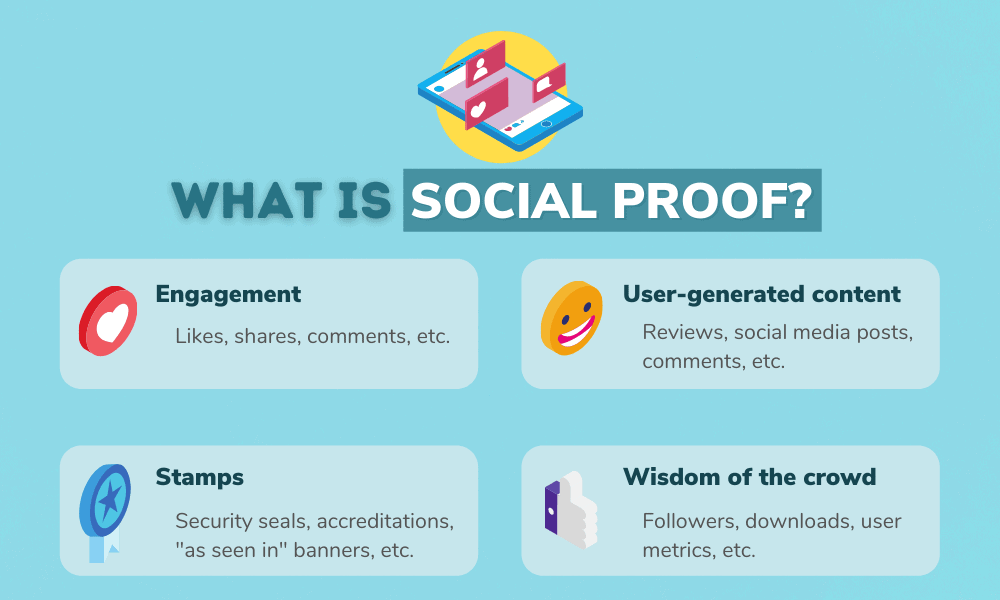Building Trust: Social Proof Strategies
In today’s digital age, building trust with your audience is more critical than ever. With so many options available to consumers, establishing credibility and authenticity can make all the difference in whether a potential customer chooses your brand over the competition. One powerful way to build trust and credibility is through social proof. Social proof refers to the influence that the actions and opinions of others have on our own behavior. In this post, we’ll explore the concept of social proof and share effective strategies for leveraging it to build trust and credibility with your audience.
In today’s digital world, trust is a precious commodity. Consumers are bombarded with marketing messages and can be skeptical of brand claims. Here’s where social proof steps in, acting as a powerful tool to build trust and credibility for your brand.
Social Proof: The Psychology Behind Why It Works
Social proof taps into the basic human instinct to follow the actions of others. We naturally assume that if others trust a brand or product, it must be trustworthy. Social proof acts as a form of social validation, reducing perceived risk and encouraging us to make similar choices.

1. Customer Testimonials and Reviews
One of the most powerful forms of social proof is customer testimonials and reviews. Positive reviews and testimonials from satisfied customers can significantly influence purchasing decisions and reassure potential customers about the quality and reliability of your products or services. Encourage satisfied customers to leave reviews on platforms like Google, Yelp, or Trustpilot, and showcase these testimonials on your website and social media channels to build trust and credibility with your audience.
2. User-Generated Content (UGC)
User-generated content (UGC) is another valuable form of social proof that can help build trust and authenticity with your audience. When customers share photos, videos, or testimonials featuring your products or services on social media, it serves as a powerful endorsement of your brand. Encourage your followers to create and share UGC by running contests or giveaways, featuring user content on your social media channels, and incorporating UGC into your marketing campaigns to showcase the real-life experiences of your customers.
3. Influencer Endorsements
Influencer marketing has become increasingly popular in recent years, with influencers wielding significant influence over their followers’ purchasing decisions. Partnering with influencers who align with your brand values and target audience can help you leverage their social proof to build trust and credibility with your audience. Collaborate with influencers to create sponsored content, host giveaways or takeovers, and showcase their endorsements on your website and social media channels to leverage their influence and reach.
4. Social Media Engagement and Following
The size and engagement of your social media following can also serve as a form of social proof. A large and engaged following can signal to potential customers that your brand is reputable and trustworthy. Focus on building an active and engaged community on social media by sharing valuable content, responding to comments and messages, and actively engaging with your audience. Highlight your social media following and engagement metrics on your website and marketing materials to showcase your social proof and credibility.
5. Expert Endorsements and Certifications
Expert endorsements and certifications can add credibility and authority to your brand and serve as a form of social proof. If your products or services have been endorsed by industry experts, featured in publications, or certified by reputable organizations, be sure to highlight these endorsements on your website and marketing materials. This can help reassure potential customers about the quality and reliability of your offerings and build trust and credibility with your audience.
6. Case Studies and Success Stories
Case studies and success stories provide concrete examples of how your products or services have helped real customers achieve their goals or solve their problems. Sharing case studies and success stories on your website and marketing materials can provide powerful social proof of the effectiveness and value of your offerings. Highlight specific results, testimonials from satisfied customers, and before-and-after comparisons to demonstrate the tangible benefits of choosing your brand.
7. Trust Seals and Badges
Trust seals and badges from reputable organizations such as the Better Business Bureau (BBB), Norton Secured, or industry-specific associations can help build trust and credibility with your audience. Display these trust seals prominently on your website and checkout pages to reassure potential customers about the security and reliability of your website and transactions. This can help alleviate concerns about privacy and security and increase confidence in your brand.
In conclusion, social proof is a powerful tool for building trust and credibility with your audience. By leveraging customer testimonials and reviews, user-generated content, influencer endorsements, social media engagement and following, expert endorsements and certifications, case studies and success stories, and trust seals and badges, you can demonstrate the value and reliability of your brand and influence purchasing decisions. Incorporate these social proof strategies into your marketing efforts to build trust, credibility, and loyalty with your audience and differentiate your brand from the competition.


